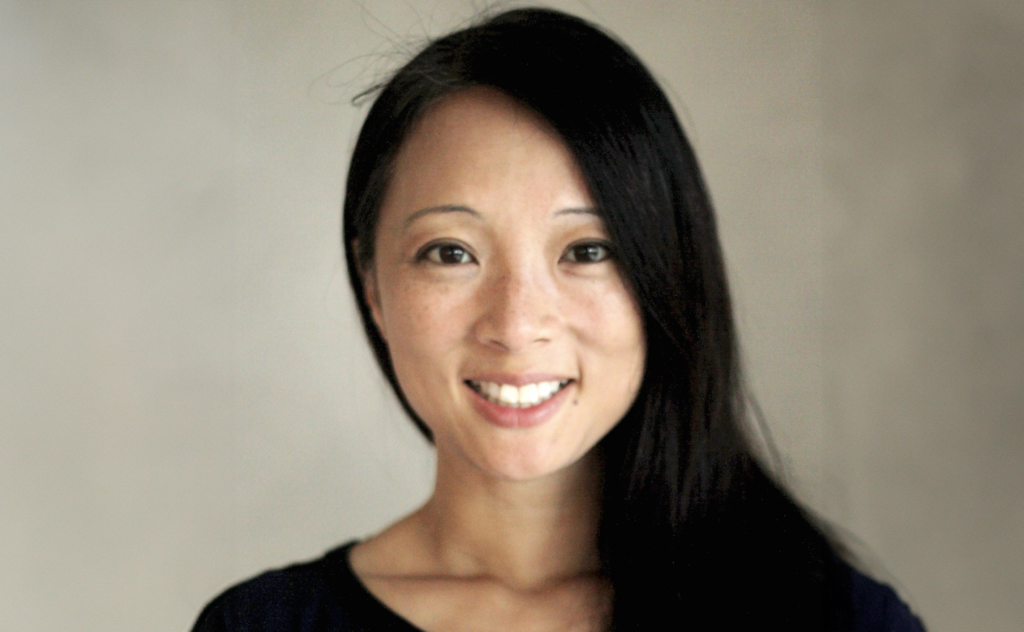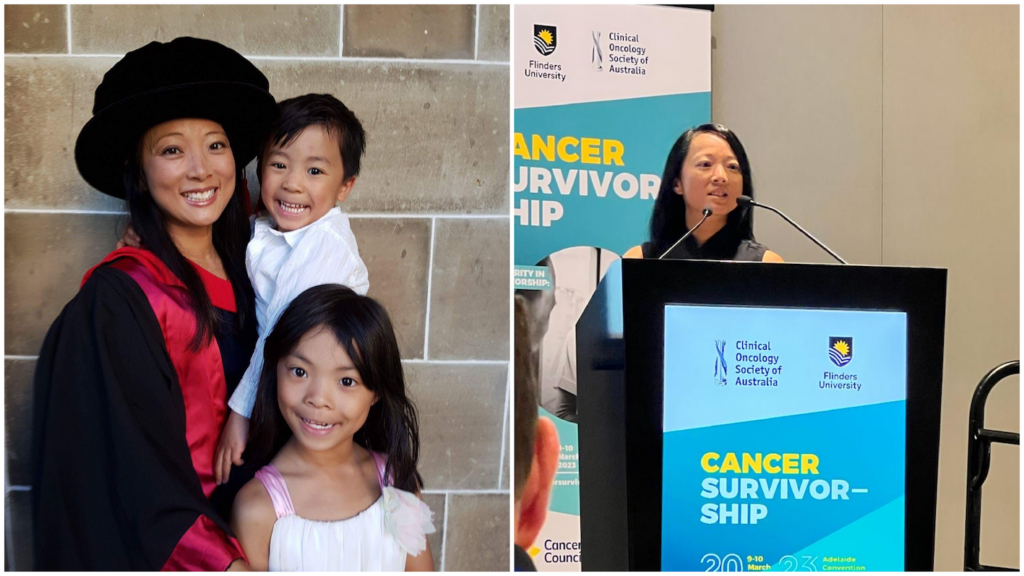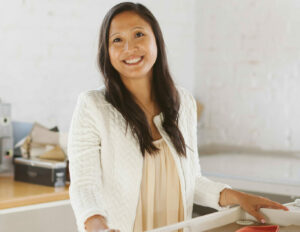Carolyn Ee: The Healthy Doctor

In the bustling world of healthcare and academia, there are individuals whose journey, leaves a profound impact on both research and patient care. Carolyn Ee (1992), affectionately known as The Healthy Doctor, is one such doctor. Since her days at Santa Maria, Catherine has embarked on a remarkable odyssey, weaving through the realms of Western and Chinese medicine, academia, and primary care research with unwavering dedication and passion.
What have you been up to since leaving Santa Maria College?
After graduating from Santa Maria, I gained dual qualifications in both Western and Chinese medicine, including a Fellowship with the Royal Australian College of General Practice (specialist qualifications in general practice). I have worked as a junior doctor for three years and as a GP for almost twenty years. I have been a clinician-researcher for almost fifteen years, graduating with a PhD in 2017. I moved to Melbourne shortly after graduating from medicine at UWA and then to Sydney in 2016. My current academic role is as a full-time Associate Professor, which is split across two universities – Western Sydney University and Flinders University. I also work one day a fortnight at Chris O’Brien Lifehouse as a Supportive Care and Integrative Oncology Specialist GP. I have two children – one born just after I submitted my master’s thesis and one during my PhD.
You've had an impressive journey in primary care research and academia. What initially sparked your interest in this field, and how has your path evolved over time?
I was fortunate to have early exposure to research as a GP trainee with the opportunity to undertake a research selective term. I found that I enjoyed the pace of research, which allowed me to think about one problem for many weeks or months, instead of many problems within ten or fifteen minutes, which is the case in general practice! I was also passionate about expanding the evidence base on integrative medicine, especially acupuncture, which I practised for many years as a fully trained Chinese medicine acupuncturist alongside general practice. I was offered a scholarship to undertake a Master of Medicine by Research, and this allowed me to conduct a pilot study on acupuncture for hot flushes. This was something I was very curious about given the apparent improvements I was seeing in clinical practice. This led to funding by the National Health and Medical Research Council for a large randomised controlled trial on acupuncture, which became my PhD.
I have just completed my eighth postdoctoral year and am considered a mid-career researcher. My research role is now extremely busy – jam-packed with supervising PhD and other research students, managing multiple projects, applying for grants, and contributing to governance and leadership. Up until recently, I have held more than seven concurrent leadership roles, most at a national level, and I contribute as an expert GP on multiple advisory committees. There are a lot of evening meetings and a great deal of travel, both interstate and international. But I’m also at the stage where I get to work with amazing teams of people, and together, we are aiming to improve the health and wellbeing of people living with chronic diseases.
Your work in guideline development and translation into practice has made a significant impact globally. Is there a specific project or initiative you're particularly proud of in this area?
I contributed as a Guideline Development Group member for the 2023 update of the international evidence based PCOS guideline. PCOS affects at least 10% of females and is a significant health concern. I feel very privileged to have been part of this fantastic initiative, which has been translated around the world. I hope that this substantially improves the care that is provided to people with PCOS and leads to improved physical and emotional wellbeing. My research included learning about how to translate the guidelines into general practice, and these findings are being implemented into new guideline implementation tools.
My team and I have recently been awarded a Medical Research Future Fund grant to co-design and run a patient navigation program for people from Chinese and Vietnamese speaking backgrounds with cancer. I am thrilled to be leading this project, which has been described as a game changer for culturally and linguistically diverse communities affected by cancer and is a partnership between ten community, not-for-profit and primary care organisations.
Last year I also launched two significant initiatives in integrative medicine. One was a world-first Recognition of Extended Skills in Integrative Medicine by the RACGP, and another was a 50-hour short course on Foundations of Advanced Integrative Medicine for GPs. Both of these will strengthen the delivery of high-quality integrative medicine in general practice.
Being both a GP and a leader in integrative medicine, how do you incorporate research findings into your clinical practice, and how does this influence your approach to patient care?
Research findings are incredibly important when assisting patients to make the best decisions about their care. They differ from anecdotal findings (eg someone on Facebook reporting that x treatment worked for them) because research aims to systematically limit any potential confounders or bias (would the person on Facebook just have gotten better over time, for example?) However, research findings are only one of the factors to consider when making a decision. Other factors include clinical experience, and personal values and preferences. Also, research findings may not always be relevant to the individual patient as the research may not have been conducted on people that are similar to the individual. My approach is person-centred; I provide my patients with the scientific information they need on potential benefits and risks in order to help them make the best decision for their individual circumstances. I add to that my clinical experience and their values and preferences.

Your blog and social media have a large following. How do you use these platforms to promote health and wellbeing?
The main message I am trying to convey to my audience is that they are not alone in their struggles. I’ve been very honest and open on my blog about my own challenges with work-life balance, parenting, and overall wellbeing. One of the biggest lessons I have learned is that we all need to be kinder to ourselves and I try to promote this as much as I can on social media.
You spearheaded the Western Sydney Integrative Health initiative. Can you share some challenges and successes you've encountered?
It’s been exciting to have established Australia’s first university-based integrative health centre, Next Practice Western Sydney Integrative Health, on our Westmead campus. There have been many challenges such as the Covid-19 pandemic significantly delaying our launch, and the GP workforce crisis (triggered by decades of funding neglect with Medicare rebates failing to keep up with real world costs) impacting on our ability to recruit GPs to the new centre. However, our vision of an evidence-informed, evidence-generating centre that uses a GP-led team-based model of integrative healthcare has attracted significant philanthropic funding, which we have used to subsidise the cost of receiving integrative healthcare, and we have been able to help hundreds of patients with their physical and mental health. I am particularly proud of the cancer supportive care program that we run, which provides discounted acupuncture, oncology massage and yoga therapy services to people living with cancer. We have been able to provide relief, comfort and hope for so many of our vulnerable community members, and I’m so grateful for the philanthropic support we have received, including from the Dry July Foundation.
How do you prioritise your own wellbeing while keeping up with your busy life?
Some years ago, I realised my purpose and mission in life is to learn how to do this well, so that I can help others. My family is obviously my top priority, but I also have a lot to contribute external to the home with my skills and expertise, and I know that I thrive when I am faced with intellectual challenges. My training as an integrative GP and Chinese medicine doctor taught me the importance of lifestyle medicine – so I prioritise eating well, staying active, and getting enough sleep as fundamentals to wellbeing. I know that these make a huge difference to how effective, productive and engaged I am as a parent, clinician, researcher and human being. I have also learned that work-life balance requires a lot of flexibility – from day to day, week to week, and even as needs and circumstances change as my children grow older. I have always adopted the mantra of living a life with no regrets when it comes to raising my children, and this has been my North Star when needing to make tough decisions.
On a more practical note, I use a lot of productivity ‘hacks’. The most important one of all is taking a proper break on weekends so I can recharge. I schedule my hardest work for when I’m freshest (for me, this is 6.00 am). My colleagues know that I will not book meetings before 11.00 am, as morning meetings interfere with my productivity. I turn email off when I work, batch meetings, delegate as much as I can, and review my goals daily, weekly, monthly, and quarterly. I’m also very lucky to be able to work from home some days of the week, which allows me to be around for my family. This is all a work in progress of course and there are days and weeks when I feel like I am just treading water!
What are some of your interests outside of work, and how do they contribute to your overall wellbeing?
I run several times a week and have done so for about fifteen years. It meets my fitness and physical activity needs and mental health needs all in one! If I start to feel irritable during the week I know that going for a run will fix that immediately. I especially enjoy running in nature, for example by the beach or on a trail. Prior to the pandemic, I ran a few fun runs including the Run for the Kids in Melbourne (14km) and I’ve completed a half marathon. My family also enjoys snowboarding, surfing, and snorkelling. We live near a fantastic beach in Sydney and not a week goes by without a trip to the beach for a run, walk or surf. Whenever I need to nourish my soul, I’ll head to the beach for some ‘Vitamin Sea’.
If you’d like to find out more about Carolyn and her work, you can find her online here:
https://carolynee.net/
https://www.facebook.com/thehealthydoctor/
https://www.linkedin.com/in/carolyn-ee/
Carolyn, thank you for graciously sharing insights into your career, your approach to work-life balance, and your commitment to improving the health and wellbeing of communities worldwide.

Combating The Attention Span Crisis In Our Students – Jennifer Oaten
It is no secret that attention spans have been steadily declining, especially among younger generations growing up immersed in digital technology. The average person’s attention span when using a digital device has plummeted from around two and a half minutes back in 2004 to just 47 seconds on average today – a dramatic 66% decrease over the past two decades.

With Laurissa Knowles From Valley Depths to Mountain Peaks (1993)
Laurissa Knowles (1993) has had an incredible career journey so far, from Santa Maria College Teacher to Celebrant and Councillor.

Elevating Spaces: Diana Ellis’ Signature Touch & Architecture Magic
What happens when you mix a love for art, travel, nature, and creativity with construction and building? You get the essence of Diana Ellis’ career!
- alumni, Featured
Author: Santa Maria College
Santa Maria College is a vibrant girls school with a growing local presence and reputation. Our Mission is to educate young Mercy women who act with courage and compassion to enrich our world. Santa Maria College is located in Attadale in Western Australia, 16 km from the Perth CBD. We offer a Catholic education for girls in Years 5 – 12 and have 1300 students, including 152 boarders.






